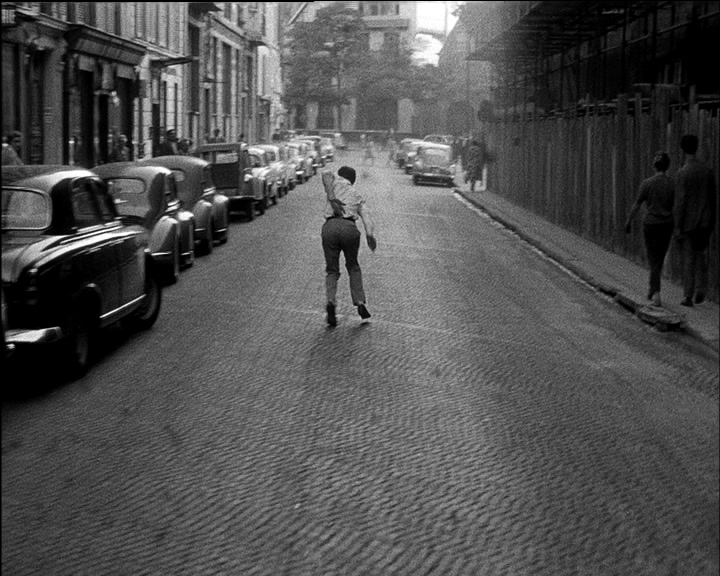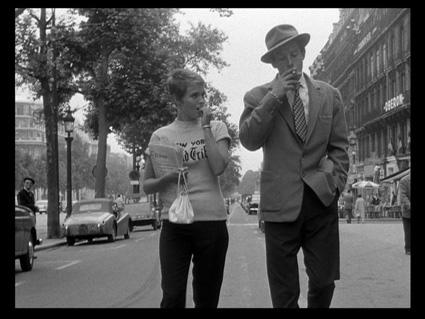Just as British pub and punk rock of the mid-to late 1970's ushered in an era of music that referenced the history of pop and thrived on irony, much of the French New Wave, nearly 20 years earlier, looked back as much as forward, an avant-garde anchored like none other before in a sense of cinema history.
Breathless (A bout de souffle), Jean-Luc Godard’s first feature, established the genre. The film broke the rules of conventional cinema narrative, in a manner that changed the seventh art forever: jump-cuts, non-sequiturs in the dialogue as well as in the unfolding story. The ripples from that giant splash have been felt all the way through the last 60 years of cinema – from Wim Wenders to Tarantino. The film opens with Michel, played by Jean-Paul Belmondo in a role that made him an instant star. He incarnates, with almost laughable excess, a Gallic version of Humphrey Bogart – the signature hat, a boyard hanging from his lips. The look, already a kind of fiction, has provided a model for self-professed young rebels ever since. Belmondo’s anti-hero, dedicated as he is to live and die as a two-bit hoodlum, combines the naturalism of the street with self-conscious play-acting, a signature dedication to irony that harks back to Duchamp’s Dada deconstructions, and announces the simultaneously vibrant and heartless essence of post-modernism.
The story is simple, and almost incidental. The film is primarily an exercise in style – film theory in action. Small-time trickster and crook Michel steals a large American car, and shoots a policeman who pursues him. He gives us a foretaste of Pierrot le fou, the crazy asocial hero of the film of the same name. He has plans to go to Rome, and searches Paris for someone who owes him some money. Patricia, the young American student he lusts after and possibly loves, is played by Jean Seberg, in her best role ever – a mixture of ingénue and savvy gangster’s moll. She denounces Michel to the police, and witnesses him being shot in the street (pictured below). On the way to the tragic climax – as predictable as in a Greek tragedy – they have long semi-philosophical conversations in a hotel room and, of course, go the cinema to see a Western. Cars (notably a convertible white Thunderbird and a Cadillac Eldorado) and fashions are the object of a particularly French kind of fetishism, reflecting a deep love-hate relationship with the USA. To point out that Godard and the other writer-directors of the nouvelle vague should have started out in film criticism, and more specifically the erudite Cahiers du cinéma, has become something a cliché, but it’s nevertheless the key to understanding the shift in French cinema in the late 1950s. The Cahiers crowd, which included Rohmer, Rivette, Chabrol and Truffaut, were all steeped in film theory, and shared a love of Hollywood, not least some of the B Movies which often allowed a greater authorial freedom to directors working on budgets that didn’t necessarily involve the pressures of studio and producer. To this day, French cinema is shot through with theoretical concerns. As a film-maker often working in France, I’m conscious of the theory-fed background of the people I work with: they love to talk for hours about the rationale for tracking shots, the language inherent in different frame sizes, the varying qualities of focus, or the semiotics of editing.
To point out that Godard and the other writer-directors of the nouvelle vague should have started out in film criticism, and more specifically the erudite Cahiers du cinéma, has become something a cliché, but it’s nevertheless the key to understanding the shift in French cinema in the late 1950s. The Cahiers crowd, which included Rohmer, Rivette, Chabrol and Truffaut, were all steeped in film theory, and shared a love of Hollywood, not least some of the B Movies which often allowed a greater authorial freedom to directors working on budgets that didn’t necessarily involve the pressures of studio and producer. To this day, French cinema is shot through with theoretical concerns. As a film-maker often working in France, I’m conscious of the theory-fed background of the people I work with: they love to talk for hours about the rationale for tracking shots, the language inherent in different frame sizes, the varying qualities of focus, or the semiotics of editing.
I remember being wowed by Breathless when I first saw it as a teenager. The play with genres, the startling cultural references (William Faulkner, Picasso, Dylan Thomas among others), the discontinuous editing style, all of these had a freshness that was absent from the other arthouse films (Fellini, Bergman, Renoir for instance) that I was hooked on. The film is very rich in allusion, and as an intellectual game, expressed with immense visual brio, it's pure delight. The cinematography of Raoul Coutard, who became Godard’s main man, combines the fluidity of hand-held camera work and the use of natural light, giving the film an immediacy that was absent in most films before 1960. Most of the New Wave directors sensed the way in which jazz could work with the moving image – the sense of improvisation enhanced by a music that thrived on spontaneous invention. In this case, the sparkling playing of French piano virtuoso and composer Martial Solal signals changes of pace and mood. In the editing, Godard used music in a traditional manner – to elicit emotion – but also in a novel way, to underline the discontinuous style of the editing.
Many decades on, I feel the same about Godard as I do about Tarantino: the formal fireworks are exciting, and yet, the playful irony and intellectual discourse – although shot through with irony and therefore undermined – rob the work of emotional engagement. This is fun, but self-aware and detached. Truffaut and Malle were always stronger on story and psychological content than Godard who remained to the end a Cahiers kind of guy.
This beautifully restored Studio Canal edition, which brings out every detail in Coutard’s stark images of Paris, is accompanied by a brief but cogent piece from film historian Colin McCabe, who places the film in context as well describing the genesis of the film’s radical re-invention of editing in a narrative film. There’s also a short French documentary, with contributions from die-hard fans that include directors Guillaume Canet, Cédric Klapisch and Michel Hazanavicius and the actor Christophe Lambert. Not the kind of edition that Criterion might have come up with, but interesting nevertheless.















Add comment